The global heat-activated beauty masks market is projected to grow from USD 1,052.4 million in 2025 to approximately USD 3,766.7 million by 2035, recording an absolute increase of USD 2,699.2 million over the forecast period. This translates into a total growth of 256.6%, with the market forecast to expand at a compound annual growth rate (CAGR) of 13.6% between 2025 and 2035. The overall market size is expected to grow by nearly 3.57X during the same period, supported by the rising consumer demand for innovative skincare solutions, increasing awareness of thermal therapy benefits, and growing adoption of premium beauty products across emerging markets.
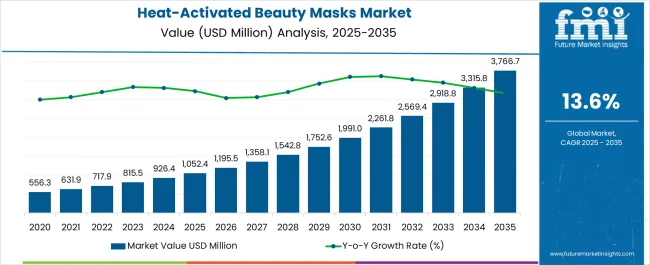
Between 2025 and 2030, the heat-activated beauty masks market is projected to expand from USD 1,052.4 million to USD 1,986.8 million, resulting in a value increase of USD 935.2 million, which represents 34.7% of the total forecast growth for the decade. This phase of growth will be shaped by rising penetration of innovative beauty technologies in skincare routines, increasing consumer willingness to invest in premium beauty products, and growing awareness about the therapeutic benefits of heat-activated formulations. Beauty brands are expanding their product portfolios to address the growing demand for multifunctional skincare solutions that combine convenience with efficacy.
From 2030 to 2035, the market is forecast to grow from USD 1,986.8 million to USD 3,750.8 million, adding another USD 1,764.0 million, which constitutes 65.3% of the overall ten-year expansion. This period is expected to be characterized by expansion of e-commerce channels, development of advanced heat-activation technologies, and integration of sustainable packaging solutions. The growing adoption of personalized skincare regimens and increasing penetration in emerging markets will drive demand for more sophisticated heat-activated beauty products and specialized application techniques.
Between 2020 and 2025, the heat-activated beauty masks market experienced significant expansion, driven by increasing consumer interest in K-beauty innovations, growing awareness of thermal therapy benefits in skincare, and rising demand for convenient at-home beauty treatments. The market developed as beauty brands recognized the potential for heat-activated formulations to enhance ingredient penetration and provide spa-like experiences at home. Social media influence and beauty influencer endorsements began emphasizing the unique sensory experience and visible results of heat-activated masks.
| Metric | Value |
|---|---|
| Estimated Value in (2025E) | USD 1,052.4 million |
| Forecast Value in (2035F) | USD 3,766.7 million |
| Forecast CAGR (2025 to 2035) | 7.7% |
Market expansion is being supported by the rapid increase in consumer preference for innovative skincare technologies and the corresponding demand for products that offer enhanced efficacy through thermal activation. Modern consumers are seeking skincare solutions that provide immediate visible results and unique sensory experiences, making heat-activated masks particularly appealing for their ability to enhance ingredient penetration and provide warming comfort during application. The technology's ability to improve blood circulation and promote better absorption of active ingredients is driving adoption among skincare enthusiasts.
The growing complexity of skincare routines and increasing consumer education about ingredient efficacy are driving demand for premium beauty products with scientifically-backed technologies. Social media platforms and beauty influencers are showcasing the unique application experience and immediate results of heat-activated masks, creating viral trends and driving consumer interest. Dermatological research supporting the benefits of thermal therapy in skincare is establishing credibility for heat-activated formulations among beauty professionals and consumers alike.
The market is segmented by function, product type, claim, channel, and region. By function, the market is divided into deep hydration, detoxifying, brightening, and anti-aging. Based on product type, the market is categorized into sheet masks, cream masks, gel masks, and self-heating patches. In terms of claim, the market is segmented into innovative/tech-enhanced, vegan, clean-label, and dermatologist-tested. By channel, the market is classified into e-commerce, pharmacies, specialty beauty retail, and salons & spas. Regionally, the market is divided into North America, Europe, Asia Pacific, Latin America, and Middle East & Africa.
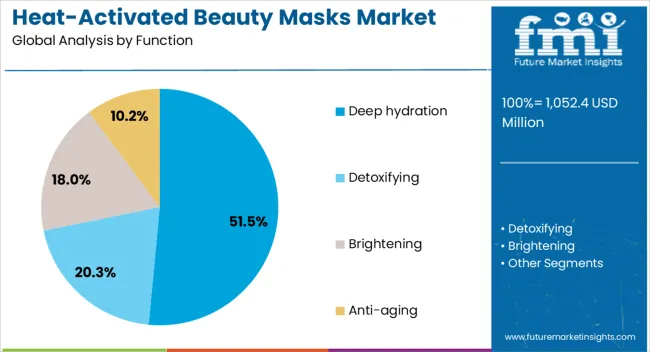
Deep hydration is projected to account for 51.5% of the heat-activated beauty masks market in 2025, making it the most dominant functional segment. This leadership is strongly supported by the universal consumer demand for intensive moisture delivery, as hydration remains the foundation of any effective skincare regimen. Heat-activated technology enhances the absorption of key ingredients such as hyaluronic acid, ceramides, and botanical extracts, ensuring deeper penetration and longer-lasting results compared to traditional masks.
The appeal of hydration-focused products spans across age groups and skin types, from younger consumers seeking dewy skin to older demographics addressing fine lines and dryness. Moreover, hydration is closely linked with anti-aging and overall skin vitality, driving consumer willingness to repurchase. With high awareness campaigns by both legacy brands and indie innovators, deep hydration masks are positioned as essential rather than optional, further consolidating their market share leadership.
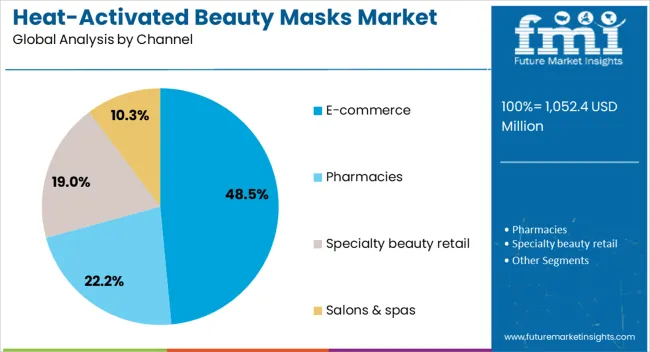
E-commerce channels are projected to contribute 48.5% of the heat-activated beauty masks market in 2025, highlighting the digital shift in consumer shopping behavior. Online platforms have become the preferred destination for beauty purchases due to their unmatched convenience, variety, and accessibility to both international and niche brands. Shoppers benefit from product comparisons, customer reviews, influencer endorsements, and video demonstrations, all of which enhance decision-making and encourage trial of newer technologies like heat-activated masks.
The growth of digital beauty communities, particularly on Instagram, TikTok, and YouTube, fuels awareness and creates viral demand for innovative skincare. Additionally, direct-to-consumer strategies enable brands to personalize offerings and build stronger loyalty through subscription models, targeted promotions, and online-exclusive launches. This shift to digital retailing aligns with broader consumer trends toward mobile shopping and at-home self-care, positioning e-commerce as a near-equal to offline retail channels in terms of market dominance.
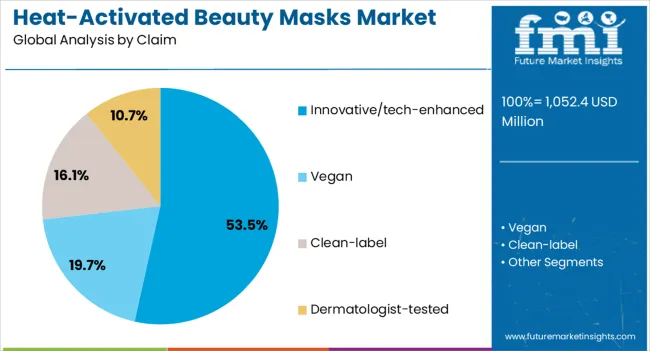
Innovative and tech-enhanced claims are estimated to hold 53.5% of the heat-activated beauty masks market share in 2025, underscoring the premium consumers place on advanced skincare solutions. Heat-activation itself is a compelling differentiator, as it delivers a multisensory experience that elevates routine masking into a spa-like treatment. This positioning resonates with tech-savvy consumers, early adopters, and those willing to pay more for products offering visible efficacy and a futuristic edge.
Beyond hydration, masks incorporating smart materials, thermal sensors, or synergistic active ingredient release mechanisms appeal to consumers seeking not just skincare, but innovation. Such claims create strong brand storytelling opportunities, reinforcing perceptions of exclusivity and high performance. With beauty increasingly merging with technology, the innovative/tech-enhanced segment allows brands to command higher price points, capture younger audiences, and maintain a distinct edge in a highly competitive global beauty landscape.
The heat-activated beauty masks market is advancing rapidly due to increasing consumer interest in innovative skincare technologies and growing recognition of thermal therapy benefits in beauty treatments. However, the market faces challenges including higher manufacturing costs compared to conventional masks, need for consumer education about proper application techniques, and potential skin sensitivity concerns with heat-activated formulations. Sustainability trends and clean beauty movements continue to influence product development and consumer purchasing decisions.
The growing trend toward personalized skincare is driving development of heat-activated masks tailored to specific skin concerns, age groups, and environmental conditions. Beauty brands are incorporating skin analysis technologies and customizable heat activation levels to provide personalized treatment experiences. These solutions enable consumers to achieve optimal results based on their individual skin needs while maintaining the convenience and efficacy of heat-activated formulations.
Modern heat-activated beauty mask manufacturers are incorporating clean beauty principles and sustainable packaging solutions to meet evolving consumer preferences for environmentally conscious products. Brands are developing heat-activation technologies using natural ingredients and biodegradable packaging materials while maintaining product efficacy and safety standards. This trend supports both environmental sustainability goals and consumer demand for clean beauty alternatives in premium skincare categories.
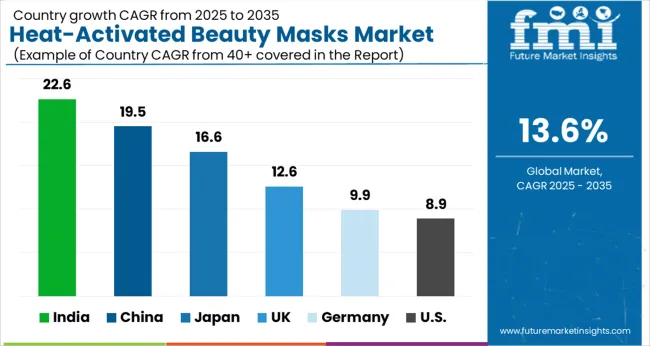
| Country | CAGR (2025 to 2035) |
|---|---|
| India | 22.6% |
| China | 19.5% |
| Japan | 16.6% |
| UK | 12.6% |
| Germany | 9.9% |
| United States | 8.9% |
The heat-activated beauty masks market is growing rapidly across global markets, with India leading at a 22.6% CAGR through 2035, driven by rapidly expanding middle-class consumer base, increasing beauty consciousness, and growing adoption of international skincare trends. China follows at 19.5%, supported by strong K-beauty influence, rising disposable incomes, and extensive e-commerce penetration in beauty categories. Japan records 16.6% growth, emphasizing advanced beauty technologies and consumer willingness to invest in premium skincare innovations.
The UK shows 12.6% growth, driven by increasing awareness of thermal therapy benefits and growing clean beauty movement. Germany grows at 9.9%, focusing on dermatologically-tested products and premium beauty experiences. The USA demonstrates 8.9% growth, supported by established beauty retail infrastructure and strong influencer marketing in beauty categories.
The report covers an in-depth analysis of 40+ countries; six top-performing countries are highlighted below.
Revenue from heat-activated beauty masks in India is projected to exhibit the highest growth rate with a CAGR of 22.6% through 2035, driven by rapidly expanding urban middle class, increasing exposure to international beauty trends through social media, and growing consumer willingness to experiment with innovative skincare technologies. The country's young demographic and increasing disposable income are creating significant demand for premium beauty products that offer unique experiences and visible results. Major international beauty brands are establishing comprehensive distribution networks to capture the growing Indian market opportunity.
Government initiatives promoting digital commerce and increasing smartphone penetration are facilitating access to international beauty brands and educational content about advanced skincare technologies. The growing influence of beauty influencers and social media platforms is driving awareness and adoption of heat-activated beauty products among urban consumers seeking premium skincare experiences.
Demand for heat-activated beauty masks in China is expanding at a CAGR of 19.5%, supported by strong consumer affinity for innovative beauty technologies, extensive e-commerce infrastructure, and increasing influence of K-beauty and J-beauty trends. The country's sophisticated beauty consumers are driving demand for products that combine traditional skincare wisdom with modern technology innovations. Live streaming beauty demonstrations and social commerce platforms are facilitating product education and driving adoption of heat-activated beauty solutions.
China's advanced manufacturing capabilities and growing domestic beauty brands are creating opportunities for innovative product development and competitive pricing in heat-activated beauty categories. The integration of AI-powered beauty consultation services and personalized product recommendations is enhancing consumer experiences and driving market growth in urban centers.
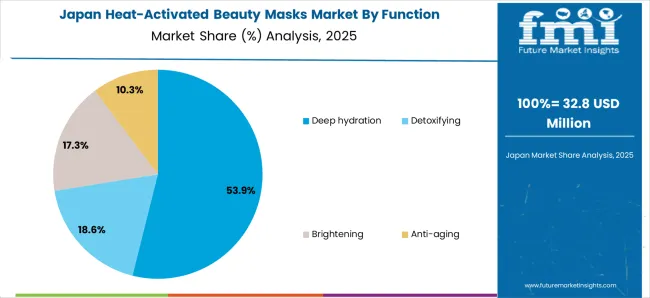
Sales of heat-activated beauty masks in Japan are growing at a CAGR of 16.6%, driven by the country's reputation for beauty innovation, consumer preference for high-quality skincare products, and advanced research in thermal therapy applications. Japanese consumers' sophisticated understanding of skincare ingredients and willingness to invest in premium beauty experiences support market growth for technologically advanced products. The country's aging population is driving demand for anti-aging solutions that provide immediate and long-term benefits.
Japan's beauty industry leadership in developing advanced formulations and application technologies is creating global trends in heat-activated beauty products. Professional beauty consultation services and department store beauty advisors are promoting proper application techniques and educating consumers about the benefits of thermal activation in skincare routines.
Demand for heat-activated beauty masks in the UK is projected to grow at a CAGR of 12.6%, supported by increasing consumer awareness of thermal therapy benefits, growing clean beauty movement, and emphasis on dermatologically-tested skincare products. British consumers' preference for products with proven efficacy and safety profiles is driving demand for heat-activated masks with clinical backing and transparent ingredient lists. The country's strong retail pharmacy network is facilitating access to professional-grade beauty products.
UK consumers' growing interest in wellness and self-care rituals is supporting adoption of heat-activated beauty masks as part of comprehensive skincare routines. Beauty subscription services and curated beauty boxes are introducing consumers to innovative heat-activated products and providing education about proper application techniques and expected results.
Revenue from heat-activated beauty masks in Germany is expanding at a CAGR of 9.9%, driven by consumer preference for scientifically-validated beauty products, emphasis on dermatological testing, and growing interest in premium skincare experiences. German consumers' careful approach to product selection and preference for products with clinical studies support market growth for heat-activated masks with proven efficacy and safety profiles.
The country's strong pharmaceutical and cosmetics industry infrastructure is supporting development of advanced heat-activated formulations that meet stringent European safety standards. Professional beauty treatment centers and medical spas are incorporating heat-activated mask treatments into comprehensive skincare protocols, driving consumer awareness and adoption.
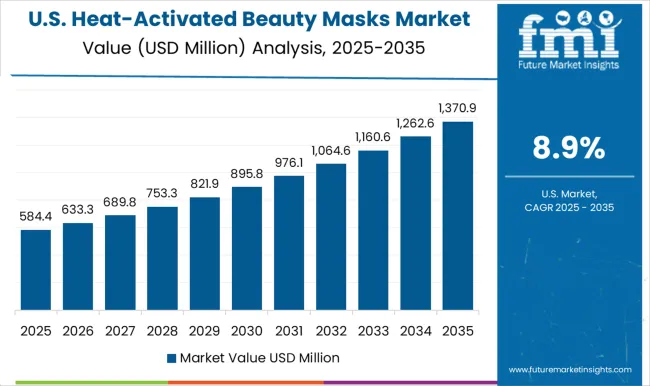
Sales of heat-activated beauty masks in the USA are expanding at a CAGR of 8.9%, driven by strong beauty influencer culture, innovative retail experiences, and growing consumer interest in K-beauty and thermal therapy trends. The country's diverse consumer base and extensive retail infrastructure support market growth across multiple demographic segments and price points. Beauty subscription services and online beauty communities are driving product discovery and education about heat-activated beauty benefits.
The USA market's emphasis on convenience and results-driven skincare is supporting adoption of heat-activated masks that provide spa-like experiences at home. Major beauty retailers are creating dedicated sections for innovative beauty technologies, including heat-activated products, and providing in-store demonstrations and educational content.
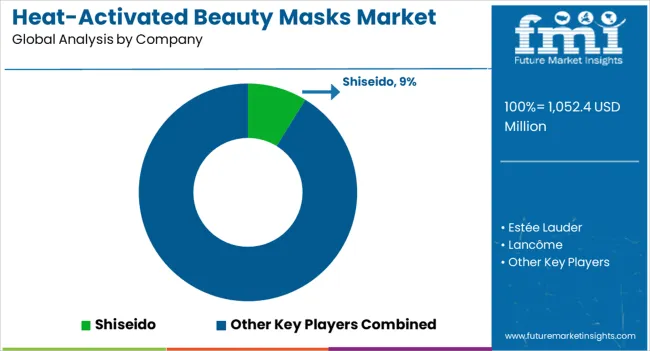
The heat-activated beauty masks market is defined by competition among international beauty conglomerates, specialized skincare brands, and innovative K-beauty companies. Companies are investing in advanced thermal activation technologies, sustainable packaging solutions, clinical research, and influencer marketing to deliver effective, convenient, and appealing beauty experiences. Strategic partnerships, product innovation, and geographic expansion are central to strengthening product portfolios and market presence.
Shiseido leads the global market with an 9% value share in 2025, leveraging its Japanese heritage in beauty innovation and advanced research capabilities in thermal therapy applications. The company's comprehensive product portfolio and strong presence in premium beauty channels support its market leadership position.
Other significant players collectively hold 91% of the market, including Estée Lauder with its focus on luxury positioning and clinical efficacy, Lancôme emphasizing French skincare expertise and premium consumer experiences, and Dr. Jart+ driving K-beauty innovation in heat-activated formulations. These companies compete through product differentiation, brand positioning, and strategic retail partnerships.
Clinique focuses on dermatologist-developed formulations and allergy-tested products, while Neutrogena emphasizes accessibility and proven skincare science. Skyn Iceland specializes in Nordic-inspired cooling and heating therapies, and Patchology offers innovative patch-based heat activation technologies. L'Oréal Paris leverages its global reach and research capabilities, while 111Skin positions itself in the ultra-premium segment with professional-grade formulations.
| Items | Values |
|---|---|
| Quantitative Units (2025) | USD 1,052.4 million |
| Function | Deep hydration, Detoxifying, Brightening, Anti-aging |
| Product Type | Sheet masks, Cream masks, Gel masks, Self-heating patches |
| Claim | Innovative/tech-enhanced, Vegan, Clean-label, Dermatologist-tested |
| Channel | E-commerce, Pharmacies, Specialty beauty retail, Salons & spas |
| Regions Covered | North America, Europe, Asia Pacific, Latin America, Middle East & Africa |
| Countries Covered | United States, Canada, United Kingdom, Germany, France, China, Japan, South Korea, India, Brazil, Australia and 40+ countries |
| Key Companies Profiled | Shiseido, Estée Lauder, Lancôme, Dr. Jart+, Clinique, Neutrogena, Skyn Iceland, Patchology, L'Oréal Paris, and 111Skin |
| Additional Attributes | Dollar sales by activation method and ingredient type, regional demand trends, competitive landscape, buyer preferences for self-heating versus passive masks, integration with clean-beauty/eco labels, innovations in thermoresponsive polymers, encapsulated actives, and smart-pack tech |
Claim:
The global heat-activated beauty masks market is estimated to be valued at USD 1,052.4 million in 2025.
The market size for the heat-activated beauty masks market is projected to reach USD 3,766.7 million by 2035.
The heat-activated beauty masks market is expected to grow at a 13.6% CAGR between 2025 and 2035.
The key product types in heat-activated beauty masks market are deep hydration, detoxifying, brightening and anti-aging.
In terms of claim , innovative/tech-enhanced segment to command 53.5% share in the heat-activated beauty masks market in 2025.






Full Research Suite comprises of:
Market outlook & trends analysis
Interviews & case studies
Strategic recommendations
Vendor profiles & capabilities analysis
5-year forecasts
8 regions and 60+ country-level data splits
Market segment data splits
12 months of continuous data updates
DELIVERED AS:
PDF EXCEL ONLINE
Beauty and Wellness Market Size and Share Forecast Outlook 2025 to 2035
Beauty and Personal Care Packaging Market Size and Share Forecast Outlook 2025 to 2035
Beauty and Personal Care Surfactants Market Size and Share Forecast Outlook 2025 to 2035
Beauty Supplements Packaging Market Size and Share Forecast Outlook 2025 to 2035
Beauty Concierge Services Market Size and Share Forecast Outlook 2025 to 2035
Beauty Drinks Market Size and Share Forecast Outlook 2025 to 2035
Beauty-from-Within Drinks Market Size and Share Forecast Outlook 2025 to 2035
Beauty Supplement Market Analysis - Size, Share, and Forecast Outlook 2025 to 2035
The Beauty and Personal Care Product Market is segmented by product type, distribution channel and region through 2025 to 2035.
Beauty Subscription Market Growth - Innovations, Trends & Forecast 2025 to 2035
Market Share Breakdown of Beauty Pillowcase Manufacturers
Beauty Pillowcase Market Report - Growth & Industry Outlook 2024-2034
C-Beauty Product Market Analysis - Size, Share, and Forecast Outlook 2025 to 2035
J-Beauty Product Market Analysis by Product Type, Type, Distribution Channel, and Region through 2035
K-Beauty Product Market Analysis by Product Type, End-user, Distribution Channel, and Region through 2025 to 2035
USA Beauty and Personal Care (BPC) Retail Vending Machine Market Outlook 2025 to 2035
SEA C-Beauty Product Market Analysis - Size, Share, and Forecast Outlook (2025 to 2035)
Snail Beauty Products Market
Edible Beauty Infusions Market Analysis - Size, Share, and Forecast Outlook 2025 to 2035
Coffee Beauty Products Market Size and Share Forecast Outlook 2025 to 2035

Thank you!
You will receive an email from our Business Development Manager. Please be sure to check your SPAM/JUNK folder too.
Chat With
MaRIA